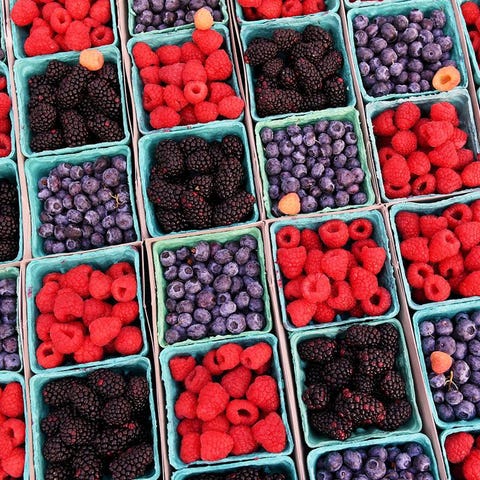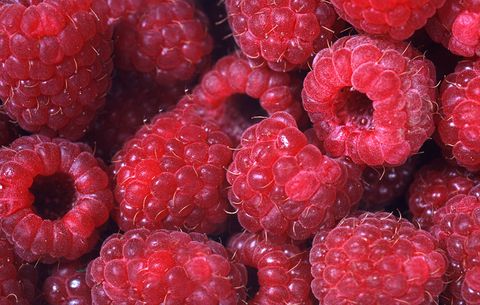
All fruit is healthy, but which reigns supreme?
ASKING WHICH FRUIT is healthiest is sort of like asking which exercise is best for your muscles: The answer is determined by the benefit you’re after.
“Depending on what characteristics a person is looking for in a fruit—whether it is a higher fiber content, more vitamins like vitamin C, or more minerals like potassium—one fruit might be nutritionally superior to another,” says Lisa McAnulty, Ph.D., a professor of nutrition at Appalachian State University.
But even this idea of nutritional “superiority” is kind of silly. All fruit is good for you. All fruit is rich in vitamins, minerals, and other nutrients. All fruit is loaded with disease-fighting antioxidants and a good source of stomach-filling fiber. All fruit is superior.
If anyone has ever told you not to eat fruit for any reason (fruit is high in sugar, fruit is high in calories, blah blah blah), know that they are flat-out, totally, and completely wrong.
No legitimate registered dietitian we have ever talked to at Men’s Health has ever, under any circumstance, recommended that you stop eating fruit. This has not stopped so-called experts from telling their Instagram followers that fruit will make you fat, drive up your risk of diabetes, or default on your mortgage.
The truth is, you’re probably not eating enough fruit. Only 12 percent of adult men are eating the recommended goals of at least 2 cups of fruit and 3½ cups of vegetables each day, according to the Centers for Disease Control.
Which means that any fruit that you may eat—apple, orange, banana, blueberries, pears, mango, dragonfruit, whatever—you should probably just eat the dang thing.
But, if you want to go deeper on the health benefits of specific fruits, so be it.
Who are we to not give you the truth you seek?
What Are The Healthiest Fruits To Eat?
Well, if you skipped over the intro, it’s important. So go back and read it.

After crunching some numbers using the USDA Nutrient Database, we determined that these are the healthiest fresh fruit sources for different vitamins and nutrients.
- Fiber: Raspberries, 8 g per cup
- Protein: Passionfruit, 5 g per cup
- Calcium: Dates, 96 mg per cup
- Iron: Persimmons, 3.75 mg per cup
- Magnesium: Dates, 81 mg per cup
- Potassium: Guava, 688 mg per cup
- Zinc: Blackberries, 0.76 mg per cup
- Vitamin C: Guava, 377 mg per cup
- Folate: Guava, 81 mg per cup
- Choline: Clementines, 21 mg per cup
Again, these are nutrient-specific rankings and ultimately kind of useless because you’re not really eating fruit for certain nutrients, but there you go.
The bottom line: Eat fruit, and a wide variety of it, to reap all the many benefits.
Is The Sugar In Fruit Bad For You?
Despite what you might have heard, there isn’t a big difference among whole fruits when it comes to their effect on your blood sugar levels.
It’s worth nothing that the kind of sugar you find in fruit is not the same kind of added sugar that you’ll find in processed foods.
Fruits that are high in natural sugar also tend to contain both soluble and insoluble fiber, which slows the absorption of these fruit sugars and so prevents big blood-sugar spikes, says Robert Lustig, M.D., professor emeritus of pediatrics at the University of California, San Francisco and author of Fat Chance: Beating the Odds Against Sugar, Processed Food, Obesity, and Disease. “So even if you’re taking in a lot of sugar with some fruits, you’re not absorbing that sugar,” he adds.
Cool tip: Blending fruit (like in a smoothie blender) breaks down its insoluble fiber, and so allows your body to absorb a lot more fruit sugar in a short period of time. “The blades of the smoothie machine shear long strands of insoluble fiber to smithereens,” Lustig says.
While you’ll still get all the fruit’s vitamins and nutrients, you need to be careful about overdoing it with smoothies, he says.
Which Single Fruit Is The Best To Add To Your Diet?
All of them.
But assuming you’re sticking to whole fruits, and you’re wondering which kind is the absolute best to add to your diet, there is one type that should top your shopping list: berries.
Berries are also packed with a variety of healthy plant chemicals called polyphenols, she says. These include anthocyanins and anthocyanidins, which research has linked to improved heart and brain health, reduced cancer risks, improved insulin sensitivity, and better blood pressure scores. More evidence has tied the antioxidant bioactive compounds in berries to lower levels of inflammation and other health benefits.
Raspberries in particular may be king of the hill when it comes to good-for-you fruits. Along with all the healthy berry attributes mentioned above, raspberries contain more fiber than sugar, per USDA estimates. That’s a very good thing. Research has consistently linked dietary fiber to lower rates of disease and death, but most Americans aren’t getting nearly enough of it. (The Institute of Medicine advises adult men to eat 30 to 38 grams of fiber a day, but the average man eats half that much.) That makes raspberries an especially healthy addition to your diet.
What Are The Best Fruits To Eat Daily?
Again, all of them. (Are you seeing a trend here?)
“Since different fruits possess different phytochemicals with the ability to exert a wide variety of beneficial health effects, it would be unwise to consume only one type of fruit,” McAnulty says, adding that a healthy diet should include about two cups a day of assorted fruits.
And “assorted” includes, but is not limited to:
- Apples
- Grapes
- Melons
- Dates
- Jackfruit
- Jujubes
- Gooseberries
- Elderberries
- Figs
- Bananas
- Mangos
- Watermelon
- Oranges
- Pomegranates
- Guava
- Pawpaws
- Durian
- Raspberries
- Persimmons
- Starfruit
- Papayas
- Plum
- Pears
- Cherries
- Apricots
- Cranberries
- Lychee
- Kiwis
- Dragonfruit
- Peaches
- Grapefruit
- Strawberries
- And many, many more
Important Notice: This article was originally published at www.menshealth.com by Markham Heid and Paul Kita where all credits are due.
Disclaimer
The watching, interacting, and participation of any kind with anything on this page does not constitute or initiate a doctor-patient relationship with Dr. Farrah™. None of the statements here have been evaluated by the Food and Drug Administration (FDA). The products of Dr. Farrah™ are not intended to diagnose, treat, cure, or prevent any disease. The information being provided should only be considered for education and entertainment purposes only. If you feel that anything you see or hear may be of value to you on this page or on any other medium of any kind associated with, showing, or quoting anything relating to Dr. Farrah™ in any way at any time, you are encouraged to and agree to consult with a licensed healthcare professional in your area to discuss it. If you feel that you’re having a healthcare emergency, seek medical attention immediately. The views expressed here are simply either the views and opinions of Dr. Farrah™ or others appearing and are protected under the first amendment.
Dr. Farrah™ is a highly experienced Licensed Medical Doctor certified in evidence-based clinical nutrition, not some enthusiast, formulator, or medium promoting the wild and unrestrained use of nutrition products for health issues without clinical experience and scientific evidence of therapeutic benefit. Dr. Farrah™ has personally and keenly studied everything she recommends, and more importantly, she’s closely observed the reactions and results in a clinical setting countless times over the course of her career involving the treatment of over 150,000 patients.
Dr. Farrah™ promotes evidence-based natural approaches to health, which means integrating her individual scientific and clinical expertise with the best available external clinical evidence from systematic research. By individual clinical expertise, I refer to the proficiency and judgment that individual clinicians acquire through clinical experience and clinical practice.
Dr. Farrah™ does not make any representation or warranties with respect to the accuracy, applicability, fitness, or completeness of any multimedia content provided. Dr. Farrah™ does not warrant the performance, effectiveness, or applicability of any sites listed, linked, or referenced to, in, or by any multimedia content.
To be clear, the multimedia content is not intended to be a substitute for professional medical advice, diagnosis, or treatment. Always seek the advice of your physician or other qualified health providers with any questions you may have regarding a medical condition. Never disregard professional medical advice or delay in seeking it because of something you have read or seen in any website, video, image, or media of any kind. Dr. Farrah™ hereby disclaims any and all liability to any party for any direct, indirect, implied, punitive, special, incidental, or other consequential damages arising directly or indirectly from any use of the content, which is provided as is, and without warranties.










